Arts & Entertainment
Oprah’s gayest shows
Talk show legend never shied from LGBT topics. Her last episode aired on Wednesday.
Oprah, even in her early years, never shied from LGBT topics on her eponymous show, which ended its run this week. (Photo courtesy of Harpo Productions)
Everybody knows Oprah ended her eponymous talk show this week, but one thing missed in the mainstream hoopla was how often and unabashedly she dealt with LGBT topics during her 25-year run.
Oprah and her flock have consistently denied speculation that she herself may be gay. Gay OWN talk show host Brad Lamm told the Blade in March the question has lingered so long he finds it “offensive.” Winfrey confessed frustration over the issue to Barbara Walters in a 2010 interview because its persistence, she said, implied dishonesty on her part.
A look back through the topics of the show’s 4,561 episodes reveals a bounty of LGBT guests, perhaps none more memorable than a 1987 landmark episode that found Oprah visiting Williamson, W.Va. (population: 5,600) to interview Mike Sisco, a gay man who’d contracted AIDS while living in Dallas and who’d returned home to his family in West Virginia.
Word had spread in the small town that Sisco had AIDS and hysteria ensued when he went swimming in a public swimming pool. Sisco told Oprah residents were fleeing “like people do in those science fiction movies when they see Godzilla in the street or something.” The mayor closed the pool and Sisco was ostracized.
Oprah interviews the late Mike Sisco in his hometown of Williamson, W.Va., in 1987. Sisco, who was gay and had AIDS, caused hysteria by swimming in a public pool. (Photo courtesy of Harpo Productions)
It was the height of AIDS hysteria when confusion about how the disease could be contracted was at its peak. Sisco said he agreed to do the show to help educate the public. Rumors were running rampant in the town that Sisco had been seen spitting on food at the local McDonald’s and on produce at a grocery store.
“Mike Sisco’s story is heartbreaking because it shows the reactions/actions of human beings when fear takes hold, when ignorance is abundant and when there is a mob mentality,” blogger Lola Nicole wrote. “[He] went to be with his family so they could care for him, so he could feel loved. He got exactly the opposite.”
Last September, as Oprah started her final season, she visited Sisco’s three sisters, Patricia, Tina and Anna. Sisco died in 1996 and controversy surrounded him until the bitter end — a family fight ensued about where he could be buried. In the ensuing years, his sister Anna had come out as a lesbian.
Oprah also interviewed several of the residents who’d been against Sisco’s presence in the original episode. Some said they’d wished they’d been more compassionate.
Oprah said her goal in doing both episodes was to remind people to be compassionate.
“I think that is the complete message of this whole series we did here today and 23 years ago,” she said at a press conference after the 2010 episode. “I understand people’s fear because in 1987 we still didn’t know everything and it’s understandable that people would have questions and what was represented here in Williamson really was a microcosm for the country. We used Williamson as a symbol for what was going on in the rest of the country.”
Other famous LGBT-related episodes include:
- Gay pianist Liberace made his final public appearance on the show on a Christmas Day episode in 1986. He died about six weeks later of AIDS-related complications.
- Ellen DeGeneres came out on a 1997 episode. Oprah also appeared on her sitcom as her therapist.
- A 2003 episode that had run without incident initially, was rerun in 2005 and caused a major controversy because a guest gave an explanation of rimming, albeit in a hetero context.
- A landmark 2004 episode called “A Secret Sex World: Living on the Down Low” brought the largely black phenomenon of married men having sex with men on the side to light. It became part of the national lexicon.
- Last November, singer Ricky Martin discussed being a gay father.
- In March, “Family Ties” actress Meredith Baxter discussed being a lesbian.
- A January episode was devoted to coming out.
- In May, 2008, Oprah interviewed Cher and Tina Turner at Caesar’s Palace in Las Vegas. Oprah idol Diana Ross also made a handful of appearances on the show.
- An October 2006 episode was called “Wives Confess They are Gay.”
- A March, 2009 episode was called “Women Leaving Men for Other Women.”
- The “Will & Grace” cast convened in May 2006 for a farewell episode.
- In July, 2010 former high school football quarterback Kimberly Reed discussed her late ‘90s sex change. Her documentary was shown at Reel Affirmations.
- And just weeks ago, Oprah interviewed Chaz Bono about his transition and new documentary and book.
Theater
José Zayas brings ‘The House of Bernarda Alba’ to GALA Hispanic Theatre
Gay Spanish playwright Federico García Lorca wrote masterpiece before 1936 execution

‘The House of Bernarda Alba’
Through March 1
GALA Hispanic Theatre
3333 14th St., N.W.
$27-$52
Galatheatre.org
In Federico García Lorca’s “The House of Bernarda Alba,” now at GALA Hispanic Theatre in Columbia Heights, an impossibly oppressive domestic situation serves, in short, as an allegory for the repressive, patriarchal, and fascist atmosphere of 1930s Spain
The gay playwright completed his final and arguably best work in 1936, just months before he was executed by a right-wing firing squad. “Bernarda Alba” is set in the same year, sometime during a hot summer in rural Andalusia, the heart of “España profunda” (the deep Spain), where traditions are deeply rooted and mores seldom challenged.
At Bernarda’s house, the atmosphere, already stifling, is about to get worse.
On the day of her second husband’s funeral, Bernarda Alba (superbly played by Luz Nicolás), a sixtyish woman accustomed to calling the shots, gathers her five unmarried daughters (ages ranging from 20 to 39) and matter-of-factly explain what’s to happen next.
She says, “Through the eight years of mourning not a breeze shall enter this house. Consider the doors and windows as sealed with bricks. That’s how it was in my father’s house and my grandfather’s. Meanwhile, you can embroider your trousseaux.”
It’s not an altogether sunny plan. While Angustias (María del Mar Rodríguez), Bernarda’s daughter from her first marriage and heiress to a fortune, is betrothed to a much younger catch, Pepe el Romano, who never appears on stage, the remaining four stand little chance of finding suitable matches. Not only are they dowry-less, but no men, eligible or otherwise, are admitted into their mother’s house.
Lorca is a literary hero known for his mastery of both lyrical poetry and visceral drama; still, “Bernarda Alba’s” plotline might suit a telenovela. Despotic mother heads a house of adult daughters. Said daughters are churning with passions and jealousies. When sneaky Martirio (Giselle Gonzáles) steals the photo of Angustias’s fiancé all heck kicks off. Lots of infighting and high drama ensue. There’s even a batty grandmother (Alicia Kaplan) in the wings for bleak comic relief.
At GALA, the modern classic is lovingly staged by José Zayas. The New York-based out director has assembled a committed cast and creative team who’ve manifested an extraordinarily timely 90-minute production performed in Spanish with English subtitles easily ready seen on multiple screens.
In Lorca’s stage directions, he describes the set as an inner room in Bernarda’s house; it’s bright white with thick walls. At GALA, scenic designer Grisele Gonzáles continues the one-color theme with bright red walls and floor and closed doors. There are no props.
In the airless room, women sit on straight back chairs sewing. They think of men, still. Two are fixated on their oldest siter’s hunky betrothed. Only Magdelena (Anna Malavé), the one sister who truly mourns their dead father, has given up on marriage entirely.
The severity of the place is alleviated by men’s distant voices, Koki Lortkipanidze’s original music, movement (stir crazy sisters scratching walls), and even a precisely executed beatdown choreographed by Lorraine Ressegger-Slone.
In a short yet telling scene, Bernarda’s youngest daughter Adela (María Coral) proves she will serve as the rebellion to Bernarda’s dictatorship. Reluctant to mourn, Adela admires her reflection. She has traded her black togs for a seafoam green party dress. It’s a dreamily lit moment (compliments of lighting designer Hailey Laroe.)
But there’s no mistaking who’s in charge. Dressed in unflattering widow weeds, her face locked in a disapproving sneer, Bernarda rules with an iron fist; and despite ramrod posture, she uses a cane (though mostly as a weapon during one of her frequent rages.)
Bernarda’s countenance softens only when sharing a bit of gossip with Poncia, her longtime servant convincingly played by Evelyn Rosario Vega.
Nicolás has appeared in “Bernarda Alba” before, first as daughter Martirio in Madrid, and recently as the mother in an English language production at Carnegie Melon University in Pittsburgh. And now in D.C. where her Bernarda is dictatorial, prone to violence, and scarily pro-patriarchy.
Words and phrases echo throughout Lorca’s play, all likely to signal a tightening oppression: “mourning,” “my house,” “honor,” and finally “silence.”
As a queer artist sympathetic to left wing causes, Lorca knew of what he wrote. He understood the provinces, the dangers of tyranny, and the dimming of democracy. Early in Spain’s Civil War, Lorca was dragged to the the woods and murdered by Franco’s thugs. Presumably buried in a mass grave, his remains have never been found.
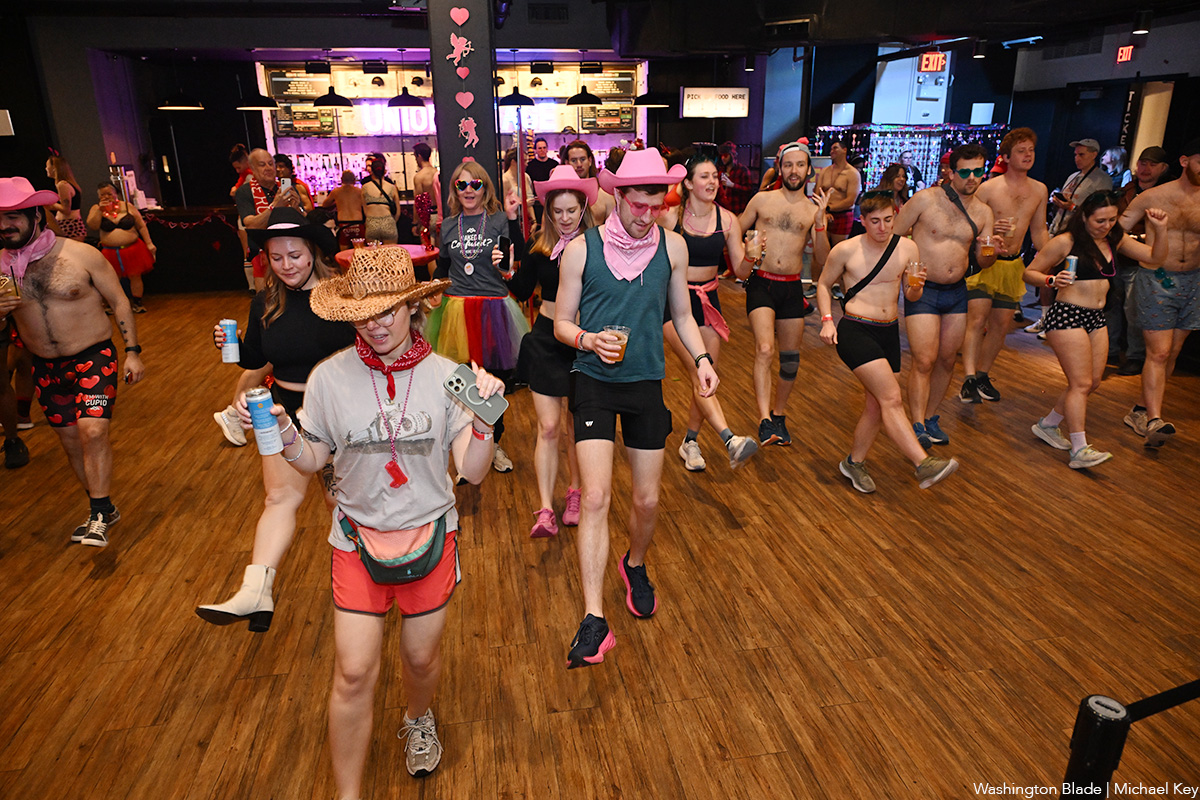
Cupid’s Undie Run, an annual fundraiser for neurofibromatosis (NF) research, was held at Union Stage and at The Wharf DC on Saturday, Feb. 21.
(Washington Blade photos by Michael Key)
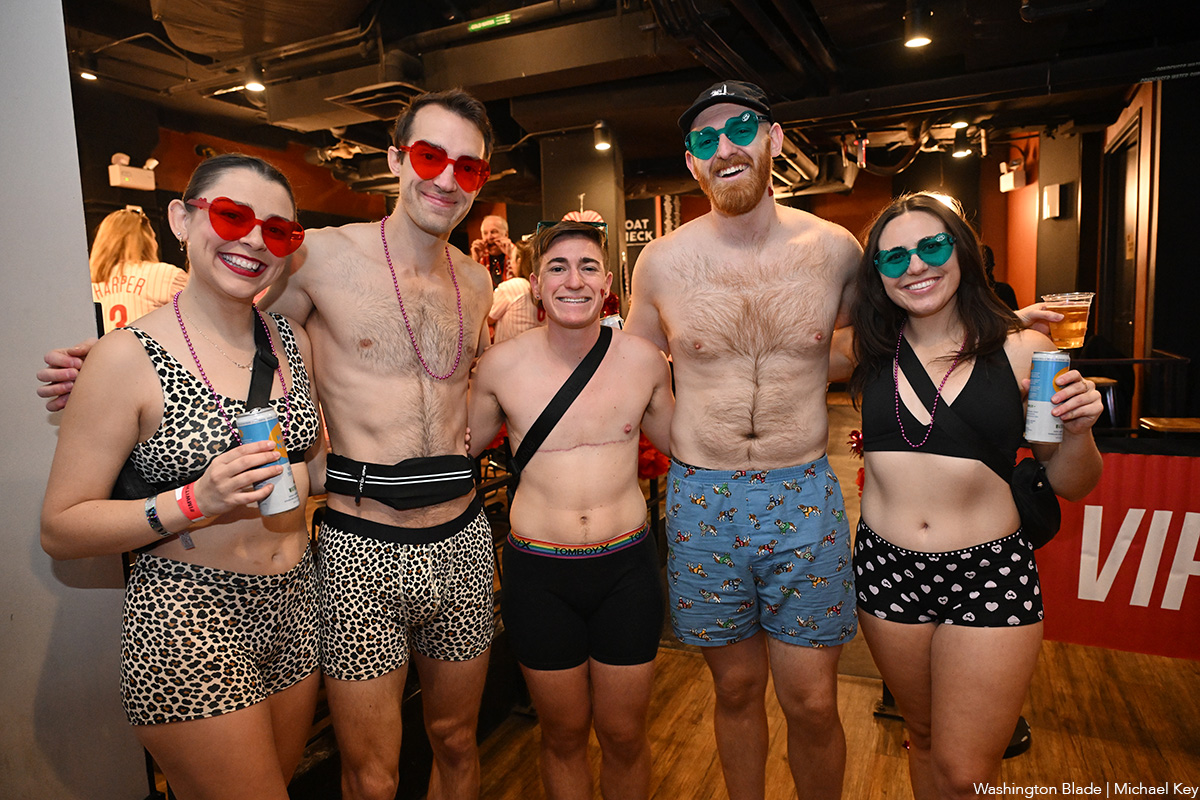



Sweat DC is officially expanding to Shaw, opening a new location at 1818 7th St., N.W., on Saturday, March 28 — and they’re kicking things off with a high-energy, community-first launch event.
To celebrate, Sweat DC is hosting Sweat Fest, a free community workout and social on Saturday, March 14, at 10 a.m. at the historic Howard Theatre. The event features a group fitness class, live DJ, local food and wellness partners, and a mission-driven partnership with the Open Goal Project, which works to expand access to youth soccer for players from marginalized communities.
For more details, visit Sweat DC’s website and reserve a spot on Eventbrite.
-

 Massachusetts5 days ago
Massachusetts5 days agoEXCLUSIVE: Markey says transgender rights fight is ‘next frontier’
-

 Opinions4 days ago
Opinions4 days agoGay Treasury Secretary’s silence on LGBTQ issues shows he is scum
-

 New York5 days ago
New York5 days agoLawsuit to restore Stonewall Pride flag filed
-

 U.S. Military/Pentagon4 days ago
U.S. Military/Pentagon4 days ago4th Circuit rules against discharged service members with HIV














